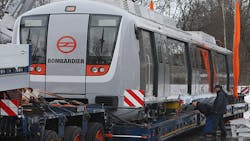India Ups Foreign Investment in Defense and Railway
NEW DELHI -- As new Prime Minister Narendra Modi's administration moves to reform and revive the ailing economy, India's cabinet approved plans to open its defense and railways industries to foreign investment.
The Cabinet agreed late Wednesday to increase the limit on foreign direct investment in defense to 49% from 26%, and allow unlimited investment in railway infrastructure, according to the Press Trust of India news agency.
The government, which unveiled both plans in the budget last month, is attempting to push ahead with much-needed reforms after sweeping to power at elections in May with the biggest mandate in 30 years. But its efforts hit a major hurdle this week, when the opposition blocked its attempts to introduce legislation to lift investment in the insurance sector.
Cabinet approval comes on the eve of U.S. Secretary of Defense Chuck Hagel's visit to India to strengthen ties between the two militaries and to drum up defense deals.
"The U.S. recognizes the immense potential for its companies in the Indian arms market" with the lifting of the investment cap, analyst Sameer Patil from Mumbai-based thinktank Gateway House said this week.
India, the world's biggest arms importer, has traditionally relied on Russia but has turned to the United States in more recent years for equipment and other technology. Modi's government wants to speed up modernization of its Soviet-era military after years of slow procurement and the collapse of deals over corruption allegations.
Investment in India's vast and crumbling state-run railway network, which carries 23 million passengers a day, is desperately needed after years of neglect.India struggles to fund upgrades of the network, partly developed under British colonial rule, because most of its revenues are spent on operating costs.
"The increase in FDI for railways ... will have a positive impact on the economy and growth," said Vishwas Udgirkar, a director of Deloitte India. But investment was not expected to flow overnight, with foreign companies first needing to form joint ventures with India firms before taking cautious steps, he said.
Copyright Agence France-Presse, 2014
About the Author
Agence France-Presse
Copyright Agence France-Presse, 2002-2025. AFP text, photos, graphics and logos shall not be reproduced, published, broadcast, rewritten for broadcast or publication or redistributed directly or indirectly in any medium. AFP shall not be held liable for any delays, inaccuracies, errors or omissions in any AFP content, or for any actions taken in consequence.
